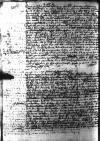Quod Serenissima Maiestas Vestra Regia adeo tam clementer excusationem meam ob adversam et malam valetudinem, quae me ne sancti et serenissimi ⌊regis⌋, desideratissimi parentis Serenissimae Maiestatis Vestrae et domini mei clementissimi, exequiis interessem impedivit, susceperit et eam admiserit, humillimas Serenissimae Maiestati Vestrae ago gratias. Prona quidem voluntas mihi non defuit, quominus hoc ultimum obsequium ⌊domino meo⌋ praestarem, verum cum eam voluntatem et hoc morigerendi studium, quod Serenissimae Maiestati Vestrae debeo, morbus, quo me Deus corripuit, impediverit, iterum suppliciter oro me ob hoc impedimentum clementer excusatum habere velit et eum, qui iam ob concussum et conquassatum corpus ad longinqua itinera Serenissimae Maiestati Vestrae utilis esse non potest, ad alium usum destinare eiusque consilio, quod parvum in me sentio, in posterum uti.
Cum etiam nuntii spectabilis ⌊magistratus Elbingensis⌋ iuxta mandatum et iussionem Serenissimae Maiestatis Vestrae ad iussa divo ⌊parenti⌋ Serenissimae Maiestatis Vestrae persolvenda se nunc ad aulam eiusdem conferant et ibidem alia quaedam negotia cum Serenissima Maiestate Vestra nomine dictae ⌊civitatis⌋ tractanda in commissis habeant, humillime oro Serenissima Maiestas Vestra eos clementer audire et illis se benignum exhibere atque ita absolutos ad suos laetos remittere velit, nec, si tardius forsan advenerint, moram eam, quae non ob eorum culpam accidit, sed quod omnes hic ⌊conventum⌋ per Serenissimam Maiestatem Vestram ante ⌊comitia Regni⌋ indicendum exspectavimus, in malam partem illis interpretari .
Me in gratiam Serenissimae Maiestatis Vestrae supplicissime commendo. Cui a Domino Deo longaevam vitam cum omnium rerum et regiminis sui felicissimo successu precor ex animo.
